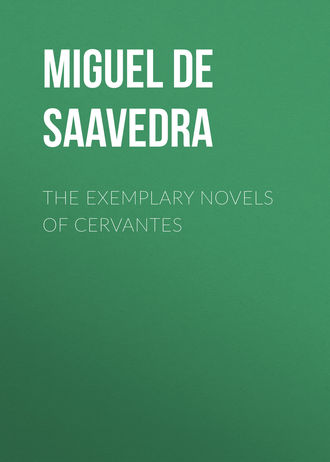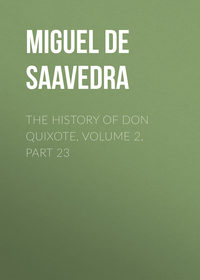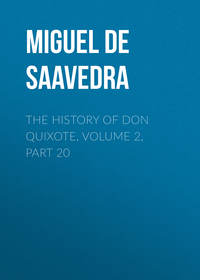 полная версия
полная версияThe Exemplary Novels of Cervantes
Everybody in the house was grieved for Richard's illness for he was beloved by them all, and by his parents to the utmost degree, both because he was their only child, and because his virtues, his worth, and good sense deserved all their affection. The physicians could not make out the nature of his complaint, nor could he himself venture to declare it. At last, one day when Isabella entered his room alone, to attend upon him, he said to her, with a faltering voice and stammering tongue, "Lovely Isabella, your worth, your great virtue, and exceeding beauty, have brought me to the state you see; if you would not have me perish in the worst agonies that can be imagined, say that you return the love I feel for you, and consent to my fondest desire, which is to make you secretly my wife; for I fear that my parents, not knowing your merits as I do, would refuse me a blessing to me so indispensable. If you will give me your word to be mine, I here pledge you my own, as a true catholic Christian, to be yours; and though our union be deferred, as deferred it shall be until it can take place with the church's sanction and that of my parents, yet the thought that you will surely be mine, will be enough to restore me to health, and to keep my spirits buoyant until the happy day arrives."
Whilst Richard was speaking, Isabella stood with downcast eyes, and when he had ceased, she replied with equal modesty and good sense, "Ever since Heaven, in its anger or its mercy (I know not which), withdrew me from my parents, Señor Richard, and gave me to yours, I have resolved, in gratitude for the infinite kindness they have bestowed upon me, never to act in opposition to their wishes; and without their consent, I should regard the inestimable boon you desire to confer upon me, not as a good but as an evil fortune. Should it ever be my happy destiny to be acknowledged by them as worthy of you, be assured that my heart shall be yours; but till that time comes, or should it never come, let it console you to know that the dearest wish of my soul will ever be that you may know every blessing which Heaven can bestow upon you." She said no more, but from that moment began the convalescence of Richard, and the revival of his parents' drooping hopes.
The youthful pair took courteous leave of each other, he with tears in his eyes, and she wondering in her soul to see that of Richard captive to her love. As for him, having been raised from his sick bed by a miracle, as it seemed to his parents, he would no longer conceal from them the state of his feelings, but disclosed it one day to his mother, and ended a long conversation by declaring that they might as well put him to death as refuse him Isabella, for it amounted to the same thing. He extolled the virtues of Isabella in such terms, that he almost brought his mother to think that in becoming her son's wife she would have the worst of the bargain. Accordingly she gave Richard good hopes that she would prevail on his father to assent to his wishes, as she herself did; in this she succeeded, for by repeating to her husband all Richard's arguments, she easily induced him to approve of the young man's design, and to find excuses for breaking off the match with the Scotch lady.
At this time Isabella was fourteen and Richard twenty; but even in that early spring time of their youth, they were old in sense and judgment. It wanted but four days of the time appointed by Richard's parents when he should bend his neck to the holy yoke of matrimony; and wise and fortunate did they deem themselves in choosing their prisoner to be their daughter, esteeming her virtues to be a better dower than the great wealth of the Scotch lady. The preparations for the wedding were all made, the relations and friends of the family were invited, and nothing remained but to make known the intended match to the Queen, no marriage between persons of noble blood being lawful without her knowledge and consent; but making no doubt of obtaining the royal licence, they put off applying for it to the last. Things being in this state, their joy was disturbed one evening by the appearance of one of the Queen's servants with an order to Clotald from her Majesty, requiring his appearance before her next morning with his Spanish prisoner. He replied that he would cheerfully obey her Majesty's command. The messenger retired, and left the family in great perturbation; "Alas," said dame Catherine, "what if the Queen knows that I have brought up this girl as a Catholic, and thence infers that we are all of us Christians in this house! For, if her Majesty asks her what she has learned during the eight years she has been with us, what answer can she give with all her discretion, poor timid girl, that will not condemn us?"
"Be under no fear on that account, dear lady," said Isabella; "for I trust in the divine goodness and mercy of Heaven, that it will put such words into my mouth as will not only not condemn you, but redound to your advantage."
Richard trembled as if he foreboded some calamity. Clotald cast about for some encouragement to allay his grievous fears, and found none but in his great trust in God and in the prudence of Isabella, whom he earnestly entreated to try in every possible way to avoid convicting them of being Catholics; for, though their spirits were willing to encounter martyrdom, yet their flesh was weak and recoiled from the bitter trial. Isabella assured them over and over again that they might set their minds at rest; what they apprehended should not befal them through her instrumentality; for though she knew not then what answer she should make to the questions that should be put to her on the morrow, she had a lively and confident hope that she would reply in such a manner as would be for their good.
Many were the comments and surmises they made that night on this unwelcome incident, and especially it occurred to them that, if the Queen knew they were Catholics, she would not have sent them so mild a message; it seemed reasonable to infer from it, that she only desired to see Isabella, the fame of whose incomparable beauty and accomplishments, known to every one in the capital, must have reached her Majesty's ears. Clotald and his wife confessed to themselves, however, that they had done wrong in not presenting her at court, and they thought the best excuse they could make for this, was to say that ever since she had come into their hands, they had destined her to be the wife of their son. But even this would be acknowledging themselves culpable, since it would appear that they arranged the marriage without the Queen's leave; but such an offence would probably not incur any severe punishment. In this way, they comforted themselves, and they resolved that Isabella should not be dressed humbly like a prisoner, but in rich bridal attire, such as became the betrothed of a gentleman of importance Ike their son. Next day accordingly they dressed Isabella in the Spanish style, in a robe of green satin with a long train, and slashes lined with cloth of gold and looped with the pearls, the whole being adorned with precious stones; a diamond necklace and girdle, with a fan such as is carried by Spanish ladies; and for head dress her own luxuriant golden hair entwined with diamonds and pearls.
In that sumptuous attire, with her sprightly air and marvellous beauty, she made her appearance in London in a handsome coach, fascinating the eyes and souls of all who beheld her. Clotald, his wife, and Richard rode with her in the coach, and many noble relations of the family escorted her on horseback, Clotald desiring that all these honours should be paid to his prisoner, in order that the queen might treat her as his son's betrothed. When they arrived at the palace, and entered the vast hall in which her majesty was seated, Isabella's escort halted at the lower end, and she herself advanced alone in all her inconceivable beauty, producing an effect like that of a brilliant meteor shooting through the sky on a calm clear night, or of a sunbeam darting at the first dawn of day through a mountain gorge. A comet she seemed, portending a fiery doom to the hearts of many in that presence hall. Full of meekness and courtesy, she advanced to the foot of the throne, knelt before the queen, and said to her in English, "May it please your Majesty to extend your royal hands to your servant's lips, who will henceforth esteem herself exalted, since she has been so fortunate as to behold your grandeur."
The queen remained a good while gazing on her without saying a word, figuring to herself, as she afterwards told her lady of the bed-chamber, that she had before her a starry heaven, the stars of which were the many pearls and diamonds worn by Isabella; her fair face and her eyes its sun and moon, and her whole person a new marvel of beauty. The queen's ladies would fain have been all eyes, that they might do nothing but gaze on Isabella; one praised her brilliant eyes, one her complexion, another her fine figure, another her sweet voice; and one there was who said in pure envy, "The Spaniard is good looking, but I do not like her dress."
At last the queen motioned to Isabella to rise, and said to her, "Speak to me in Spanish, maiden, for I understand it well, and shall like to hear it." Then turning to Clotald, "You have done me wrong, Clotald," she said, "in keeping this treasure so many years concealed from me; but it is such a one as may well have excited you to avarice. You are bound however to restore it to me, for by right it is mine."
"My liege," replied Clotald, "what your majesty says is quite true; I confess my fault, if it is one, to have kept this treasure until it arrived at the perfection suitable for appearing before your majesty's eyes. Now that it has done so, I had it in mind to enhance it still more, by asking your majesty's leave for Isabella to become the wife of my son Richard."
"I like her name, too," returned the queen. "Nothing was wanting to the fulness of her perfection but that she should be called Isabella the Spaniard. But, mark you, Clotald, I know that, without my leave, you have promised her to your son."
"That is true, my liege, but it was in the confident hope that the many eminent services which my ancestors and I have rendered to the crown, would obtain from your majesty favours still more difficult to grant than the leave in question, the more so as my son is not yet wedded."
"Nor shall he be wedded to Isabella," said the queen, "until he has merited it in his own person. I mean that I will not have him avail himself to that end of your services or those of his forefathers. He must himself prepare to serve me, and win by his own deserts this prize which I esteem as if she were my daughter."
The queen had no sooner uttered these last words than Isabella again fell on her knees before her, saying in Spanish, "Such thwartings as these, most gracious sovereign, are rather to be esteemed auspicious boons than misfortunes. Your majesty has given me the name of daughter; after that what can I have to fear, or what may I not hope?"
Isabella uttered this with so winning a grace, that the queen conceived an extreme affection for her, desired that she should remain in her service, and committed her to the care of a great lady, her keeper of the robes, who was to instruct her in the duties of her new position.
Richard, who saw himself thus, as it were, deprived of his life in losing Isabella, was almost at his wits' end. Agitated and discomfited, he knelt before the queen, and said, "I need no other rewards to induce me to serve your majesty than such as my ancestors have obtained in the service of your royal predecessors; but since it is your majesty's pleasure that I should have new motives and incentives for my zeal, I would crave to know in what way I may fulfil your majesty's behest?"
"There are two ships ready to set out on a cruise," said the queen, "of which I have made the Baron de Lansac general. I appoint you captain of one of them, being assured that the qualities you derive from those whose blood is in your veins will supply the defect of your years. Mark what a favour I confer upon you, since I give you an opportunity to signalise yourself in the service of your queen, to display your capacity and your valour, and to win the highest reward, methinks, which you yourself could desire. I myself will be Isabella's guardian, though she manifests that her own virtue will be her truest guardian. Go in God's name; for since you are in love, as I imagine, I expect great things from your prowess. Fortunate were the king who in time of war had in his army ten thousand soldiers in love, expecting to obtain their mistresses as the reward of their victories. Rise, Richard, and if you have anything to say to Isabella, say it now, for to-morrow you must sail."
Richard kissed the queen's hands, highly prizing the favour she had conferred upon him, and went and knelt before Isabella. He tried to speak to her, but could not, for he felt as if there was a knot in his throat that paralysed his tongue. He strove with all his might to keep down the tears that started into his eyes, but he could not conceal them from the queen. "Shame not to weep, Richard," said her majesty, "nor think less of yourself for allowing such evidence of a tender heart to escape you, for it is one thing to fight the enemy, and another to take leave of one who is dearly loved. Isabella, embrace Richard, and give him your blessing: his affection well deserves it."
Isabella's heart ached to see Richard so cast down. She could not understand what her majesty said. Conscious of nothing but her grief, motionless, and blinded by her tears, she looked like a weeping statue of alabaster. The anguish of the two lovers drew tears from most of the beholders. In fine, Richard and Isabella separated without exchanging a word; and Clotald and his friends, after saluting the queen, left the hall full of grief and pity. Isabella felt like an orphan whose parents have just been buried, and dreaded lest her new mistress should make her abandon the rule of life in which she had been brought up.
Two days afterwards, Richard put to sea, distracted among many other sources of incertitude by two reflections – one was that he had to perform exploits by which he might merit Isabella's hand; and the other, that he could perform none without violating his conscience as a catholic, which forbade him to draw his sword against those of his own faith, but unless he did so, he should be denounced as a catholic or as a coward, to the peril of his life and his hopes. But, in fine, he determined to postpone his inclinations as a lover to his duty as a catholic, and in his heart he prayed heaven to send him occasions in which he might show himself at once valiant and a true Christian, – might satisfy his queen and merit Isabella.
For six days the two vessels sailed with a prosperous wind, shaping their course for the Western Islands, for, in that direction they could not fail to fall in with Portuguese East India men, or vessels returning from the West Indies; but on the seventh day the wind became contrary and continued that way so long that they could not make the islands, but were forced to run for the coast of Spain. On nearing it at the entrance of the straits of Gibraltar, they discovered three vessels, one very large and two small. Richard steered towards his commander's ship to know if it was his intention they should attack the three vessels just discovered; but on nearing it, he saw them hoist a black flag, and presently he heard a mournful sound of trumpets, indicating that either the general or one of his chief officers was dead. When he came within hail, which had not before been the case since they put to sea, there was a call from the leading ship for Captain Richard to come on board, as their general had died of apoplexy the preceding night. Sad as this news was, Richard could not help being glad, not of his admiral's death, but at finding himself in command of both ships, according to the Queen's orders for the contingency which had occurred. He went on board the flag-ship where he found some lamenting the old commander, and some rejoicing over the new one; but all promised him obedience, yet proclaimed him general with short ceremony, not having time for longer, for two out of the three vessels they had discovered had quitted the third and were bearing down upon them.
They at once made them out by the crescents on their flags to be Turkish galleys, to the great delight of Richard, who believed that with the help of Heaven he should make an important capture without prejudice to his religion. The two galleys came up to reconnoitre the English ships, which had not shown their national colours but those of Spain, in order to baffle those who might overhaul them, and prevent their recognising them as war cruisers. The Turks mistook them for trading vessels from India, and made sure of capturing them with ease. Richard took care to let them approach till they were well within range of his guns, which he let fly at them so opportunely, that with a single broadside he disabled one of the galleys, sending five balls through her middle and nearly cutting her in two. She immediately heeled over and began to founder; the other galley made haste to take her in tow, in order to get her under the lee of the large ship; but Richard, whose ships manoeuvred as rapidly as if they were impelled by oars, having reloaded his guns, pursued the retreating galleys, pouring upon them an incessant shower of balls. The crew of the crippled galley having clambered on board the large ship, Richard poured such a cross fire from his two ships on her consort, that she could neither use sails nor oars, and the Turks on board her, following the example of their comrades, took refuge in the large ship, not with the intention of defending her, but for the momentary safety of their lives. The Christian galley-slaves broke their chains, and mingling with the Turks also boarded the large ship, but as they were in danger from the musquetry of Richard's two ships as they were swarming up the side, he gave orders to cease firing on Turks and Christians alike. The former, however, had already lost the great part of their numbers, and the rest were cut to pieces with their own weapons by the revolted slaves, who, thinking the two English ships were Spanish, did marvels for the recovery of their freedom.
At last, when nearly all the Turks were killed, some Spaniards shouted from the deck to their supposed countrymen to come on board and enjoy the fruits of their victory. Richard asked them in Spanish what ship was that? They replied that she was a Portuguese ship from the West Indies, freighted with spices, and with such a quantity of diamonds and pearls that she was worth a million. She had been driven into those latitudes by a storm, much damaged, with all her guns thrown overboard, and her crew almost perishing of hunger and thirst. In that condition, being unable to make any resistance, she had been captured the day before by these two galleys, which belonged to the corsair Arnaut Mami,79 and which not having stowage room for her great cargo, had taken her in tow to convey her to the river Larache. Richard apprised them, in return, that if they supposed his two vessels were Spanish, they were greatly mistaken, for they belonged to the Queen of England. This information astonished and alarmed them, making them fear that they had escaped from one rock to founder on another; but Richard told them they had nothing to fear, and that they might rely on obtaining their liberty, provided they did not make any defence. "It would be impossible for us to do so," they said, "for as we have told you, we have neither cannon nor other arms, and have no choice but to throw ourselves upon the generosity of your general. Since he has freed us from the intolerable yoke of the Turks, let him enhance his good work by an act which will exalt his fame all over the world wherever the news reaches of this memorable victory and his magnanimity."
Richard lent a favourable ear to this request, and immediately called a council of his officers to consider what might be the best means of sending all the Christians to Spain, without incurring any risk from them, should their numbers encourage them to rise and attempt to overpower his crews. There were some who suggested that they should be brought on board one by one, and put to death as they entered. "No," said Richard; "since by God's grace we have obtained so rich a prize, I will not betray my ingratitude by such an act of cruelty. It is never well to have recourse to the sword, when, with a little forethought, the end may be secured by other means. I will, therefore, not have any Catholic Christian put to death, not that I care so much for them, but for my own sake and for yours, for I would not have the honour of our victory tarnished by cruelty. My orders are, then, that the crew of one of our ships, with all her guns and arms and the greater part of her stores, be put on board the large Portuguese vessel, which we will then take to England, and leave the Spaniards to return home on ours."
No one ventured to contravene this proposal, which to some appeared equally magnanimous and judicious, while others in their hearts condemned it as showing an undue leaning towards the Catholics.
Taking with him fifty arquebusiers Richard went on hoard the Portuguese ship, in which he found about three hundred persons, who had escaped out of the galleys. He immediately had the vessel he intended to discharge brought alongside, and had its guns brought on board. Then making a short speech to the Christians, he ordered them to pass into the discharged vessel, where they found stores enough for more than a month and for a greater number of people; and as they embarked he gave each of them four Spanish crowns, which he sent for to his own ship, in order partly to relieve their wants when they reached land, which was not far off; for the lofty mountains of Abyla and Calpe were in sight. They all thanked him heartily for his generous behaviour, and when they were nearly all embarked, the same person who had first spoken to him from the deck of the ship, addressed him, "You would do me a greater service, valorous sir, in taking me with you to England than in sending me to Spain; for, though it is my country, and it is but six days since I left it, I have nothing to look for there but grief and desolation.
"You must know, señor, that at the sack of Cadiz which happened about fifteen years ago, I lost a daughter, whom the English carried away with them to England, and with her I lost the comfort of my age and the light of my eyes, which since she passed from their sight, have never seen anything to gladden them. Grief for this calamity and for the loss of my property, of which I was also despoiled, so overcame me that I was no longer able or willing to apply myself to commerce, in which I had been so successful that I was commonly reputed to be the richest merchant in our whole city; and so indeed I was, for, besides my credit, which was good for many hundred thousand dollars, my estate was worth more than fifty thousand ducats. I lost all; yet all my losses would have been nothing had I not lost my daughter. After the general calamity and my own, want pressed me so hard, that not being able to bear up against it, myself and my wife – that woe-begone creature sitting yonder – determined to emigrate to the Indies, the common refuge of the well-born poor. We embarked six days ago in a packet-ship, but just outside the harbour of Cadiz we were captured by those two corsairs. This was a new addition to our affliction; but it would have been greater had not the corsair taken this Portuguese ship, which fortunately detained them until you came to our rescue."
In reply to Richard's question what was his daughter's name, the Spaniard said it was Isabella. This confirmed the suspicion which Richard had all along entertained, that the person before him was the father of his beloved mistress. Keeping this fact to himself, he told the Spaniard that he would willingly take him and his wife to London, where possibly they might obtain some intelligence about their child.
Taking them both on board his flag-ship, and having sufficiently armed and manned the Portuguese galleon, he set sail that night, avoiding the coast of Spain as much as possible, lest he should be intercepted in consequence of! information given by the liberated captives. Among the latter there were some twenty Turks, to whom also Richard granted freedom, to show that his conduct had been the result simply of his generous disposition, and not of any secret leaning to the Catholics: and he asked the Spaniards to set the Turks at liberty upon the first opportunity. The wind, which had blown fresh and fair at first, died away into a calm, to the dismay of the English, who murmured against Richard's unseasonable generosity, saying, that the liberated captives might give information of what had happened, and that if there chanced to be armed galleons in port, they might sally out and intercept them.









